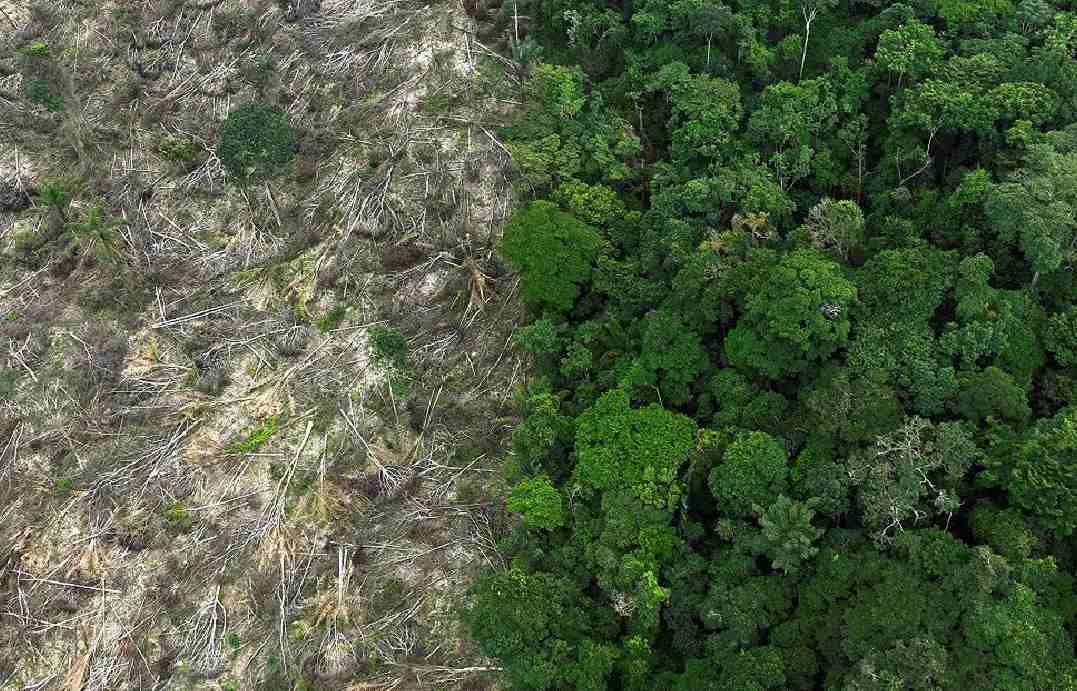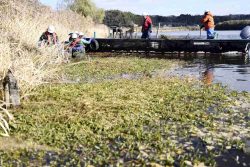
A deforested area is seen during an operation to combat deforestation near Uruara, Para State, Brazil, in January.
17:36 JST, July 13, 2023
LONDON (Reuters) — As a new European Union zero-tolerance deforestation law looms, several major investors told Reuters they are concerned about their exposure to the issue, with some saying they could quit consumer goods makers with “risky” supply chains.
The EU agreed in December on a new rule to prevent companies from selling into its market coffee, beef, soy, rubber, palm oil and other commodities linked to deforestation. Companies must prove their supply chains aren’t contributing to the destruction of forests or be fined up to 4% of their turnover in an EU member state.
Germany’s Union Investment, a top-20 investor in Unilever and Reckitt, last year wrote to 56 consumer goods companies to find out more about deforestation in their supply chains.
“The fines can be a risk for the performance of these companies in the stock market,” said Henrik Pontzen, head of ESG at Union Investment, which has about €424 billion ($467 billion) in assets under management and stakes in Nestle, Pepsico, Danone, Beyond Meat and L’Oreal.
An internal Union Investment document seen by Reuters shows that the firm received just 30 responses to its outreach. Of those, only 14 companies said they had zero-deforestation goals.
“As a major investor, this is very atypical,” said Pontzen. “Typically, we receive an answer from any company we write to. Maybe the reason for not answering is they don’t have anything to say.”
Union “will exclude companies when all our escalation options have been exhausted,” Pontzen said.
He is not alone in his frustration over the companies’ lack of engagement.
Eight major institutional shareholders — Schroders, Janus Henderson, NBIM, Union Investment, KLP, Aviva, Fidelity International and Ninety One — told Reuters they were talking to consumer goods makers about this issue, three of whom said they will identify stocks they may exit.
The legislation is expected by lawmakers to be implemented by the end of 2024 for “big operators.” Although consumer goods manufacturers are particularly exposed, other sectors that import goods associated with deforestation, including commodities houses and industrials companies, will also face scrutiny.
“The companies have to be cleaner than clean, given the fact that there’s such a high penalty,” said Jonathan Toub, a portfolio manager at Aviva, which invests over £223 billion ($278 billion) and has stakes in Tide maker P&G, Unilever, Nestle and Reckitt.
Norway’s sovereign wealth fund, NBIM, one of the world’s largest investors with over $1.3 trillion in assets under management, said the rules will impact firms that haven’t prepared for it.
“It can influence market access, potentially lead to noncompliance penalties, or impose increased due diligence costs,” said Snorre Gjerde, NBIM’s investment stewardship manager.
‘Significant ramifications’
The U.N. Food and Agriculture Organization estimates that 420 million hectares of forest — an area larger than the EU — were lost to deforestation between 1990 and 2020. EU consumption represents around 10% of global deforestation, according to the European Parliament. Palm oil and soy account for more than two-thirds of this.
The new rule will require companies to produce electronic due diligence forms to customs officers showing their supply chains are not contributing to the destruction of forests.
Consumer goods makers are counting on technology such as satellites and artificial intelligence to help eradicate deforestation from their supply chains. But the efforts may not be enough to comply with the rules, said EU lawmaker Christophe Hansen.
“They, of course, want to slow down the process or be less ambitious,” he said.
Several large consumer goods companies say they are close to meeting their ambitious zero-deforestation goals.
Nestle, the world’s biggest food company, is aiming to be entirely deforestation-free for cocoa and coffee only by 2025. The company said it has 99% assessed deforestation-free status on average for each of its meat, pulp and paper, soy and sugar primary supply chains.
Unilever, maker of Dove soap and Ben & Jerry’s ice cream, is aiming for a deforestation-free supply chain in palm oil, paper and board, tea, soy and cocoa by the end of 2023.
‘Maybe’ a little ambitious
Companies will need to show when and where commodities were produced and “verifiable” information that they were not grown on land deforested after 2020.
Magdi Batato, head of operations at Nescafe and Kit Kat owner Nestle thinks the rules are “maybe” a little ambitious.
“There is still work to be done [in the industry],” he said.
Artificial intelligence may speed up the process.
“AI is definitely part of that solution,” David Croft, Reckitt’s global head of sustainability, told Reuters.
Reckitt, which has not yet publicly disclosed that it is considering using AI to reduce deforestation, buys several commodities whose farming is typically known to damage forests. The company sources latex for Durex condoms from southern Thailand and Malaysia, working closely with farmers and plantations, in areas not associated with deforestation.
Unilever said late last year that it, too, was “applying artificial intelligence to satellite imaging to detect changes in tree cover and provide deforestation alerts.”
But these actions aren’t putting all investors at ease.
“If things don’t change, we can exclude companies,” said Arild Skedsmo, a senior analyst at Norway’s largest pension fund KLP. “The EU rules make deforestation a financial risk as well as an environmental risk.”
Top Articles in Science & Nature
-

Japan Institute to Use Domestic Commercial Optical Lattice Clock to Set Japan Standard Time
-

Japan to Face Shortfall of 3.39 Million Workers in AI, Robotics in 2040; Clerical Workers Seen to Be in Surplus
-

Record 700 Startups to Gather at SusHi Tech Tokyo in April; Event Will Center on Themes Like Artificial Intelligence and Robotics
-

iPS Treatments Pass Key Milestone, but Broader Applications Far from Guaranteed
-

iPS Cell Products for Parkinson’s, Heart Disease OK’d for Commercialization by Japan Health Ministry Panel
JN ACCESS RANKING
-

Japan PM Takaichi’s Cabinet Resigns en Masse
-

Japan Institute to Use Domestic Commercial Optical Lattice Clock to Set Japan Standard Time
-

Israeli Ambassador to Japan Speaks about Japan’s Role in the Reconstruction of Gaza
-

Man Infected with Measles Reportedly Dined at Restaurant in Tokyo Station
-

Videos Plagiarized, Reposted with False Subtitles Claiming ‘Ryukyu Belongs to China’; Anti-China False Information Also Posted in Japan






















